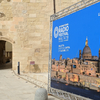Though Amber Arcades’ Annelotte de Graaf expands her sonic palette even further on second album European Heartbreak, it’s in many ways the complete antithesis of her infectious debut Fading Lines. The latter was brimming with Stereolab-like sprawls (‘Turning Light’) and retrofuturist pop (‘Perpetuum Mobile’), as De Graaf’s vaporous voice channelled this existentialist joie de vivre like a piercing ray of light.
To balloon Amber Arcades’ sonic riches with the entire Spacebomb-sorority at De Graaf’s disposal – providing a cornucopia of strings, brass, pianos, and synths – isn’t to underscore the giddiness of Fading Lines further. With all the malaise that has happened in the world, that would perhaps be a bit naive. No, the more orchestral elements are added to provide the necessary equilibrium from the bleaker meditations.
“European Heartbreak has conflicting themes of romanticizing things and looking at them cynically and dryly,” De Graaf explains. “I wanted to translate that to the music as well, which worked well by doing the bass and drum parts in (producer) Chris Cohen’s garage in Los Angeles. It’s a space of six square meters, with a bare minimum of equipment. Chris’ recording style was dry and immediate, and I think you can hear that in the drum sound. That sparsity equates nicely to the idea of stripping everything of meaning. Being cynical and nihilistic, whereas the horns and strings represent the more romanticized vision that we need to get through this mortal existence.”
Though De Graaf sports this shimmery gold velvet jumpsuit on the album cover, her face expresses a deadened sense of disillusion. The character she inhabits looks like a washed up game host who flips on the snooze button until five minutes before showtime: splendour and spectacle bring cheap respite from the sordid sentiments festering within.
And despite all that, European Heartbreak somehow feels lighter and more palatable than its predecessor. The gleaming seventies soft rock of ‘Simple Song’, the antipathetic, gospel-tinged rally of ‘Baby, Eternity’ and the starry-eyed juke joint blues of ‘I’ve Done The Best’; these songs deftly mediate some pretty disparate allusions.
Which is primarily due to De Graaf’s willingness to counter darker, nihilistic reflections with her trivializing, acerbic wit. Indeed, European Heartbreak’s levity isn’t sparked by earnest wanderlust or curiosity, but by the matter-of-fact resignation that – even under the folly of the pending apocalypse – there is grace in our gullible, clumsy attempts to make sense of the world we inhabit. That’s what we call, in equally matter-of-fact terms, quite the artistic leap.
On a windy late-summer day in Utrecht, with the first decay of autumn already afoot, De Graaf sits down to tell more.
DiS: You’ve ‘lived’ the songs on Fading Lines for quite some time, and some songs stick, whereas others have an expiration date. How do you view that record now in hindsight?
Annelotte de Graaf: I think it was a solid reflection of where I was at that point in my life. Both in terms of music and lyricism, it feels almost like a window in time when I listen back to it. I get transported back to a couple of years ago, to the kind of music I was listening to a lot. I can appreciate the record in that way, and it does justice to what I was doing at that point. But I feel like I’m in a very different place right now. Fading Lines feels more nostalgic to me now.
Fading Lines felt like an avid soul search for meaning in life, in all its facets and phases. In what way is European Heartbreak a reaction against that?
When I started writing the record, some personal shit happened in my life, things I don’t feel like getting into much detail about. Let’s just say some bad personal stuff happened on a family kind of level, and I was just really bummed out for a couple of months. Though ‘traumatized’ may be too strong a word, I needed a way to accept this and move on. I was very conscious of all the efforts I was making to be able to do this. The psychological process in this personal life event prompted me to ‘give meaning’ to it somehow, that this was needed to move on from it.
But being conscious of that made me doubt the human experience, nature, and memory. You become very conscious of the fact that you try to fit everything that happens to you into ‘your life story’: shaping memories, making some things more significant and more important than others. It’s all very wishy-washy. To me, the stories we create are ways to find meaning in life. So at first, I thought European Heartbreak was going to be more like that. The theme would be that struggle to cope with the things that happen to you, to integrate them into your life story and to question this meaning as well. But in doing so, you’re conscious of the fact that you’re creating it yourself.
Of course, I read the Guardian so I’m naturally biased in an anti-Brexit, anti-Trump way. There were all these articles about world affairs, so I was thinking a lot about politics too. I was reading this book about intersubjective reality, how some things in life, like for example a nation, aren’t real. Europe isn’t a thing. It’s not like I can touch it or smell it, it’s not a physical construct. It only exists because at some point we agreed between ourselves that it exists. The same goes for The Netherlands as a country: you and I are both Dutch because we have once agreed that we are. It’s also a way for us to feel connected to everyone else who is also Dutch. And it’s an effective way to collaborate on a massive level as a species that we otherwise wouldn’t be doing. So I was trying to link that to the things I was thinking about before, about questioning our reality, and what’s happening to us. Is this making sense at all?
Very much. I didn’t feel the need to interrupt. During the first album run, your life story gets reflected back to you in various publications. Last time I interviewed you, you told tales about hearing tapes of Bhagwan-worship songs as a youth, wanting to retire on a farm, and living in an Irish monastery. It becomes easy for me, the writer, to only cherry-pick the parts that made sense to the story of a record. Does it bother you sometimes, being profiled as an exaggeration of your true self?
It doesn’t occupy my mind, to be honest. I do read almost all the articles back, but I never had a bad experience where I didn’t recognize myself in the story. Sometimes people say stuff, like: “Oh this song sounds like U2”, which is funny.
I was thinking more about how this process of memory shaping connects to your past. In the same way, I’m thinking about a nation’s past, how we are always talking about “the good old days” in politics. That things were always better in the past. Like with Brexit, people talk about ‘taking control’, and saying they were better off before joining the European Union. And of course, that’s not true.
But in the same way, when I think about my childhood, I reminisce about it as this magical time. You tend to only remember the good stuff. Because that’s how you shape it into your life story because you want to talk about it. There is this therapy called narrative therapy, which a friend told me about, that entails helping people shape their life story in such a way that they are happy with it.
I guess when you are caught in a depression, there’s a lack of meaning, a lack of things to live for. If you feel like the protagonist in your own story, that you’re in control, and that everything happens for a reason, that can make you feel happier about your life. It’s the same thing with a nation or a concept like the European Union. They are just stories we create for ourselves.
But even a record like European Heartbreak is sort of a self-contained world, right, where you romanticize and deromanticize certain notions to construct a narrative or theme? What you said about one half the record being blustering and bright, and the other somewhat lo-fi and pragmatic, I feel that represents you as well. Because you have one leg outside of this music and art world that tends to sensationalize or romanticize. Then you have a law degree and a day job, one that requires you to make pragmatic decisions that go against your principles at times. So I reckon you have to reel your romantic tendencies in.
To be honest, it was a conscious decision to take myself more seriously as a musician. In the past I was always like: “This music thing could be fun, I might do it for like a year or three and make this record”. But gradually I became more serious about dedicating myself to that. It became more of a calling.
What do you mean by that?
That I could finally picture a life in which I wasn’t going to be tired of music. I never write songs for one record at a time, but more like for three records at a time. So I’m always writing. For the next record, and the one after that. And before I knew it I had this ten-year plan, though not as detailed as knowing what kind of record I’m going to make years from now.
It felt nice quitting my job at the time. I mean, it was scary as well – but it felt good to choose music, and take myself seriously as a musician. Also because I’m not a professionally-schooled musician, and I had a hard time taking myself seriously. By the time I was playing with my first band I thought I was too late. People in my surroundings were already putting out records, whereas I was just starting to learn to play guitar kind of correctly. I don’t know a lot of music theory, I can’t do any crazy guitar solos.
But you had a lot of other experiences students at the rock academy probably would never have, because it would just be about playing music, and not about what happens outside of that.
Yeah, sure. It just felt good to be able to realize I could do this, to have things to say. At least for myself, I want to figure this out. And seeing myself doing this for like the next ten years, I always need to feel that there has to be some progression at least. I don’t have to be Madonna or anything, but I do need to feel like it’s headed somewhere.
There are different reasons why people want to make records. Some do it to connect to other people in some unspoken, mysterious way. Other people do it to escape from their day-to-day troubles. But some artists need a record to articulate what’s happening around them in the most honest way possible.
Writing lyrics is a way for me to tie things going on my life at the moment together in some substantial way. I’m always trying to find connections between the emotional and physical, the imagined and possible. This is a straightforward example: you are sitting close to me, so I see you in closer proportions. But when I look at that tree over there, it looks smaller. If there’s a problem in my head – something in my head I’m worried about – and it just happened yesterday, it’s big. And it can occupy my whole mind. But maybe a month from now it will be a lot smaller.
Is ‘Self Portrait In A Car At Night; based on a specific moment?
No, not really. I was reading a lot of David Berman’s poetry, the frontman of The Silver Jews. He has this poem called Self-Portrait At 28. It was a play on that, about feeling overwhelmed by existence, seeing how ridiculous life is, and how it’s so stupid that you’re taking everything so seriously.
Even though you bubble wrap some hard-hitting truths, I do sense some glee in making European Heartbreak. You’re having fun with that freedom to step out of your skin a bit more.
I know this record can be interpreted as pretty political, and there are indeed elements of that in it. But I also don’t take myself too seriously, playing this annoying swaggy, sarcastic academic rock star. I’m a prototype of what the world hates right now: an educated woman with an outspoken opinion. You know, the nosey academic type. When you’re a woman, that’s maybe even harder to get away with. Kind of like Father John Misty, and most people hate it when he does it, and he’s a guy. I feel like people accept it more from a guy.
European Heartbreak is out now via Heavenly Recordings. For more information about Amber Arcades, including forthcoming tour dates, please visit their official website






















